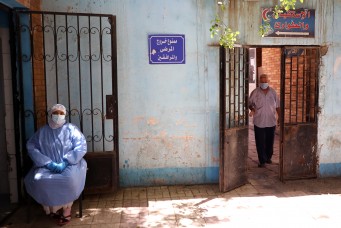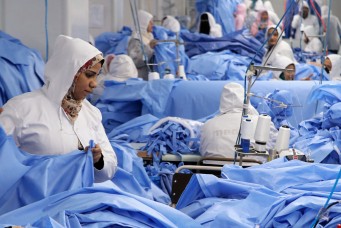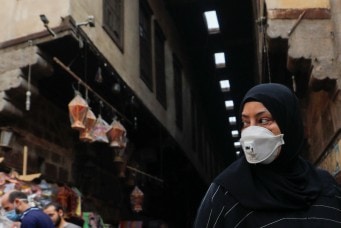The Last Tourist in Luxor
During the coronavirus pandemic, the crown jewel of Egypt’s economy, tourism, is suffering, but people are coming together to make the best of a bad situation.
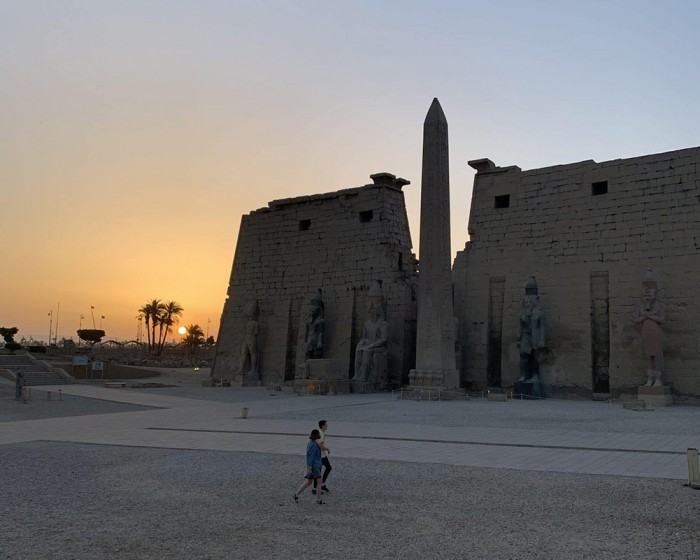
Tourist destinations in Luxor, Egypt stand vacant, April 2020. The Cairo Review/Audrey Lodes
On March 17, the Esna Lock allowed the last cruise ship to continue down the Nile on its voyage from Aswan to Luxor. As the passageway locked behind the 57-cabin ship Le Fayan, it was the first glimpse into the imminent closures in Egypt and around the world in attempts to halt the spread of the COVID-19 coronavirus.
Just hours earlier, the Egyptian government had announced that domestic and international flights would stop operating from Cairo International Airport within 48 hours, transforming what was meant to be a relaxing three-night vacation into a nightmare for tourists in Upper Egypt. Suddenly, flight prices quadrupled, options to get out of the country dwindled, and airlines cancelled booked tickets. As the next two days passed, the situation deteriorated by the minute until only four tourists were walking through the Luxor Temple.
The scene was repeated elsewhere on the voyage from Aswan to Luxor as the ship made pit-stops at the usual sites: the Philae Temple, Kom Ombo, Valley of the Kings, and Karnak, which are usually crawling with tourists, stood almost empty; there were more cats leisurely strolling through the corridors than people.
Magnificent temples dating as far back as 2055 BC ordinarily move onlookers to stop and reflect on the feats of humanity. The vibrant colors of hieroglyphics depicting successions of dynasties and epic battles are symbolic of what makes humans so unique—our resilience and perseverance. Yet, in the backdrop of these massive stone temple walls loomed a pandemic sweeping the globe and directly challenging this steadfast notion of human invincibility.
The flood of tourists to Aswan and Luxor first began to fall to a trickle when 45 passengers aboard a Nile cruise tested positive for COVID-19 on March 7. However, cruise ships continued to sail. But, by the time Le Fayan docked at the Kom Ombo temple in Aswan on March 16, it was the only boat in the bay.
“I have not seen it this empty…ever. Even after 2011, it was not this bad, this is a really sad moment,” explained a Luxor-native tour guide who has worked in the field for decades, and prefers to go by Ahmed.
“I was booked until May. After Coronavirus hit the whole world, all the bookings were canceled.”
Within a day of the announcement of flight suspensions, a general atmosphere of anxiety descended on not only tourists who hastily continued to finish their sightseeing before leaving the country, but also on those working at the sites. Vendors and shopkeepers watched their livelihoods, in khaki shorts clutching alabaster vases and Egyptian relics, leave on the last commercial airlines available.
Ahmed confirmed a dreary reality two weeks after the last tourist flights left the country. “It is affecting everyone: the shopkeepers, the drivers, those working on the cruise ships, the hotels. They are relying on that and we get paid when we work. Right now, we are not working so we do not get paid.”
During the two-day trip, it seemed Ahmed was friends with everyone he came in contact with. He embraced the spices seller in Luxor, the crocodile keeper in the Nubian village, and the oil shop owner in Aswan like they were family. The network of workers that have become friends over the years made it clear how far reaching the impact the virus would have on workers in small cities. Eerily vacant temples and outdoor markets that resembled ghost towns signaled the impending isolation about to hit Cairo.
Tourism Bounced Back, and Then …
Tourism is the backbone of economies in smaller cities in Egypt. “In Luxor and Aswan they all rely on the tourism industry; [these cities] have no other industries. We are talking about a few million people who are affected by the coronavirus. The people who are affected really badly are those working in the tourism industry,” Ahmed says.
By the end of March, a bustling capital city home to 20 million people came to a near-standstill as the Egyptian government imposed restrictions on mobility, mirroring measures taken around the world.
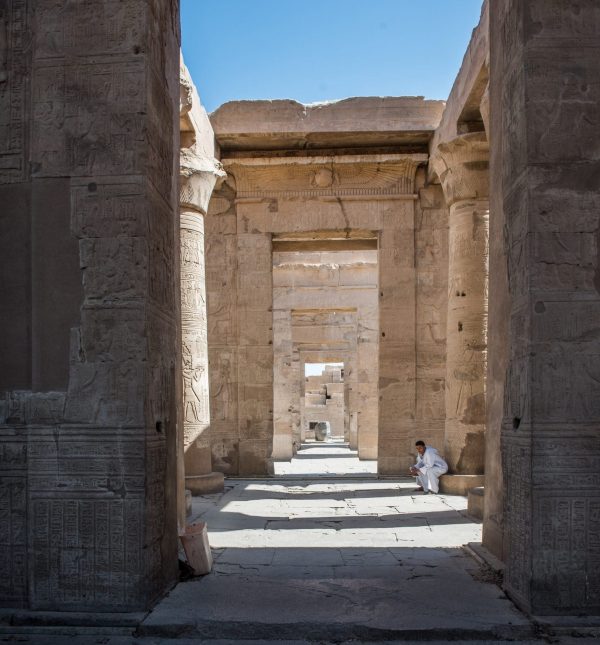
While Egypt falls on the lower end of reported cases, the potential danger to a dense concentration of people residing in Cairo could prove catastrophic in the case of a large outbreak. As of the evening of April 9, there are 1,699 confirmed cases and 118 deaths in Egypt from COVID-19.
The first round of restrictions included banning large public gatherings, suspending football matches and sports of all kinds, and prohibiting mosque prayers, including those on Friday. The call to prayer now encourages Muslims to observe at home. On March 15, schools and universities closed, and on March 25 Prime Minister Mostafa Madbouly imposed a nation-wide two-week curfew from 7 PM to 6 AM. Violators of the curfew face hefty penalties ranging from an EGP 4,000 fine to imprisonment. On April 9, the curfew was extended to last at least until April 23.
In the 21st century, Egypt’s tourism industry has experienced rollercoaster-like fluctuations, but was finally returning to peak levels of prosperity. In 2010, Egypt attracted 14 million tourists, earning revenues of $12.5 billion according to the World Tourism Organization. The 2011 Egyptian uprising that resulted in the ousting of President Hosni Mubarak left political and social unrest in its wake; in 2013, numbers in both revenue and tourists dropped dramatically with fewer than 8 million tourists and revenues of half their peak numbers. Over the past three years, however, there has been a steady return of visitors; Egypt welcomed 13.6 million tourists in 2019.
Tourism is crucial for the Egyptian economy. The International Monetary Fund reported that this industry “contributes close to 12 percent of Egypt’s GDP, 10 percent of employment, and almost 4 percent of GDP in terms of receipts, as of 2019.”
COVID-19 struck at a period of growing prosperity in the tourism industry. In fact, the Central Bank of Egypt (CBE) announced that Egypt earned a record breaking $13.03 billion in 2019 from tourism.
The CBE announced, “The total revenues of the tourism sector increased to 13.03 billion dollars in 2019 compared to 11.6 billion dollars in 2018, and 12.5 billion dollars in 2010 which was the peak year in terms of tourist flows.”
“In 2018 and 2019, tourism was excellent in Egypt, we were working so hard…it was amazing,” says Mona Wagdy, director of the travel office at the American University in Cairo.
And 2020 looked to be a record-breaking year for Egypt’s tourism industry.
Hany El-Desouki, general manager of a travel agency who has worked in the industry for 19 years, said that 2020 would have been an excellent year, adding that “Egypt was supposed to welcome more than two million tourists in March and April.”
When all tourists began leaving Egypt amid global airport closures and governments recalling their citizens from overseas, the incomes of many workers departed with them.
With each site visited on the route from Aswan to Luxor, the air of uncertainty morphed into hints of desperation. Small-shop vendors took understandably aggressive approaches, staff on the cruise ship didn’t even bother to look busy, and a sense of dread about what tomorrow will look like felt as contagious as the virus.
Finding Opportunity in Crisis
But El-Desouki sees this tumultuous time as having hidden potential opportunities: more time to reassess, look out for one another, and prepare for next season. “Starting from the first week of the crisis, Egyptians began to stand by each other, especially with those who are working for daily wages. Now, a lot of Egyptian charity organizations are receiving [a lot of] donations and requests to provide monthly income for those families [who will be most affected].”
In fact, large corporations and individuals are stepping in across Egypt. Orange Egypt, the mobile network operator company, has donated EGP 5 million to aid those families whose income is affected by new curfew laws.
And on an official front, the Financial Regulatory Authority has donated EGP 250 million to support vulnerable groups in addition to President Abdel Fattah El-Sisi’s EGP 100 billion plan to fight the coronavirus while addressing the economic needs of the population. Some EGP 50 million of these funds will be allocated to the tourism sector, which official figures say employs 900,000 workers.
Additionally, in a recent announcement on April 7, El-Sisi revealed a new government plan to allocate EGP 500 to “day laborers and others in irregular mode of employment for three months”, the daily Youm7 reported.
Eslam Mohammed, whose family runs a chain of hotels in Hurghada, explained that unlike other hotels in the area, they are still paying their employees. “It is about humanity,” Mohammed explains.
Their business employs over 500 people. “If they didn’t get the money, how could they live? We have to give them money because they work here and this crisis is not their fault.”
Everyone the Cairo Review spoke to who worked in the tourism industry explained that the country is going through unprecedented circumstances; all aspects of daily life are subject to interruption, and change is the new constant.
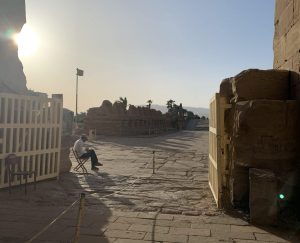
The Human Impact of COVID-19
“There are going to be global patterns that change as a result of this crisis. People’s distance will be a requirement. Airlines may change to have less crowded flights; maybe frequencies of flight arrivals and departures will be distanced,” explains Amr Badr, who has served as the managing director of Abercrombie and Kent in Egypt, a large international travel company, for almost 20 years.
Badr noted that while people have often adverse responses to change, it is inevitable after large-scale crises. As with security restrictions seen post 9/11, systematic change will result from the COVID-19 pandemic.
Badr also thinks that this is the time that companies need to show solidarity and support their employees. “The positive side is that we have more time to train people. Some hotels are deciding to do renovations and maintenance. My employees are preparing for tomorrow. Family and friends are bonding together and life is more simple; we are all equals in this.”
However, opportunities to find meaningful employment as temporary alternatives may not necessarily be equal, or available.
For Ahmed, who has been a travel guide for 30 years and is an expert on ancient Egypt, the situation is very different. “I cannot work on anything else. I am an Egyptologist, I am a guide.”
Wagdy says this is a time of clarity and a wake-up call. “There is a lot coming out of this on the personal level, on a friendship level. People need to be aware that things can change overnight. Family comes first, children come first. Uniting together and talking together during the busy days of work, we sometimes drop the most important relationships in our lives.”
When disembarking the cruise ship in Luxor to make the last available flight to Cairo, a serviceman on the cruise ship named Alaa stopped us and said, “if you need a place to stay or need anything, I live in the Old Market; you can find me there.”
This small gesture of hospitality and goodwill, in a time of great uncertainty for everyone, stands as a reminder of what really makes human beings unique. Not just perseverance, but kindness. And, despite the COVID-19 scare, Egypt still has plenty of that.
Audrey Lodes is an assistant editor and photographer at the Cairo Review of Global Affairs. Find her on Twitter at @audreylodes.
Read More
